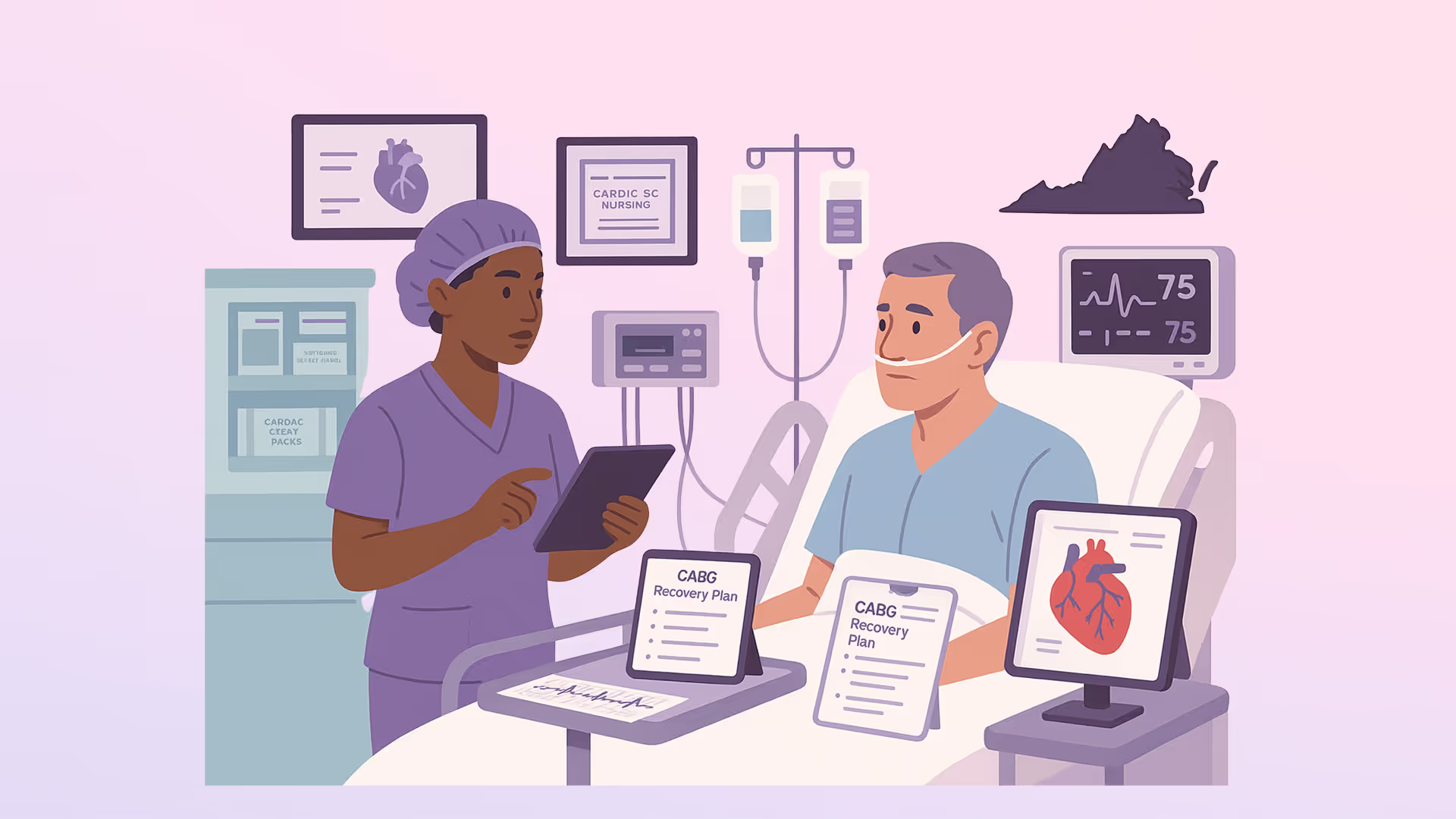TL;DR: Cardiothoracic Surgery Nurse Practitioner Salary & Career Snapshot
- High cardiothoracic surgery nurse practitioner salary – Average salary of $144,905 with top earners reaching $192K+, significantly above general nurse practitioner pay across all job types.
- Specialized cardiac surgery expertise in demand – Rising heart disorders are fueling acute care opportunities in hospital settings, ICUs, transplant programs, and outpatient cardiology areas where comprehensive patient care is essential.
- Location drives nurse practitioner pay – States like Virginia (VA), Pennsylvania (PA), and South Carolina (SC) offer excellent compensation, while California and New York (NY) provide premium salaries requiring master's degree qualifications.
- Certification and credentials boost earning potential – Specialized certifications like Cardiac Surgery Certification (CSC) and cardiovascular nurse practitioner credentials unlock top-tier positions with physicians and multidisciplinary teams.
- Diverse career opportunities for registered nurses – From pediatric cardiac surgery to heart transplant programs, urgent care positions, education roles at institutions like Mayo Clinic School of Health Sciences, and research—this field offers extensive growth for nursing professionals seeking to educate patients and families while managing complex treatment plans and acute care responsibilities.
The heart never stops beating—and neither does the demand for skilled professionals who can care for it. As cardiovascular disease continues to rise and is projected to increase significantly over the next three decades, the healthcare industry is experiencing an unprecedented need for specialized cardiac care providers. This growing demand extends far beyond physicians to include highly trained nurse practitioners who specialize in cardiothoracic surgery.
Cardiothoracic surgery nurse practitioners represent the pinnacle of advanced nursing practice, combining comprehensive patient care with specialized expertise in one of medicine's most complex fields. These dedicated professionals work alongside physicians to provide life-saving treatment plans for patients undergoing cardiac surgery, from routine procedures to complex heart transplants. Their role encompasses everything from pre-operative patient education to post-surgical management, making them indispensable members of the cardiac care team.
If you're a registered nurse considering this rewarding specialty, you're likely wondering about the financial rewards, educational requirements, and career opportunities that await. The cardiothoracic surgery nurse practitioner salary reflects the specialized nature of this field, with compensation packages that recognize the advanced skills and critical responsibilities these professionals shoulder every day. Beyond the attractive pay, this career path offers the profound satisfaction of helping patients and families navigate some of the most challenging moments of their lives.
Throughout this comprehensive guide, we'll explore everything you need to know about pursuing a career as a cardiothoracic surgery nurse practitioner, including:
- Education and certification requirements: From master's degree prerequisites to specialized cardiology nursing certification
- Detailed salary insights: Average compensation across different states, experience levels, and practice settings
- Career paths and opportunities: Various job types, specialization areas, and advancement potential
- Essential skills and qualifications: What it takes to succeed in this demanding yet rewarding field
We'll also examine how to break into this specialty and the critical role that quality clinical placements play in launching a successful cardiothoracic nursing career.
For nurse practitioner students currently navigating their education, securing quality clinical placements in specialized areas like cardiothoracic surgery can be particularly challenging. These highly sought-after rotations are essential for gaining the hands-on experience needed to excel in this field, yet finding the right preceptors and clinical sites often requires extensive networking and persistence that many students simply don't have time for while balancing coursework and existing responsibilities.
Understanding the Cardiothoracic Surgery Nurse Practitioner Role
Core Responsibilities and Patient Care
Cardiothoracic surgery nurse practitioners serve as the constant presence throughout a patient's entire surgical journey, providing continuity from initial preoperative assessment through discharge and beyond.
Comprehensive Patient Assessment and Management
The role begins with a thorough preoperative evaluation, where cardiothoracic NPs conduct detailed patient histories and physical examinations. This comprehensive care approach involves assessing both the patient's cardiac condition and identifying comorbidities that could impact surgical outcomes.
Key assessment responsibilities include:
- Preoperative evaluation: Reviewing diagnostic tests, coordinating additional investigations, and ensuring optimal patient preparation
- Medication management: Adjusting treatments, addressing drug interactions, and coordinating with specialists
- Risk assessment: Identifying potential complications and developing prevention strategies
Treatment Plan Development and Patient Education
Working closely with physicians and the multidisciplinary team, cardiothoracic nurse practitioners participate in complex decision-making processes. Their advanced clinical skills enable them to help determine surgical approaches and plan postoperative care strategies.
One of the most rewarding aspects involves educating patients and families about heart disorders, surgical procedures, and recovery expectations. This requires exceptional communication skills, as these conversations often occur during highly stressful times when patients face major cardiac surgery.
Work Environment and Daily Functions
Hospital Settings and Clinical Areas
Most cardiothoracic nurse practitioners work in hospital environments, moving between preoperative assessment clinics, intensive care units, step-down cardiac units, and outpatient follow-up clinics. In the intensive care environment, they manage patients during the most vulnerable post-operative period, monitoring cardiac rhythms, managing medications, and making rapid care decisions.
Position Types and Team Collaboration
The field offers various job types to accommodate different preferences:
- Full-time positions: Most common in major medical centers, offering comprehensive experience and the highest earning potential
- Part-time opportunities: Available in larger hospital systems with varying coverage needs
- Contract roles: Providing schedule flexibility and potentially higher hourly rates
Emergency Response and Critical Care
The acute nature of cardiac surgery means cardiothoracic nurse practitioners must respond to emergency situations, including sudden cardiac arrhythmias, bleeding complications, or post-operative emergencies. These critical situations require clinical expertise, the ability to remain calm under pressure, and skills in advanced cardiac life support.
Education and Certification Requirements
Academic Foundation
The pathway to becoming a cardiothoracic surgery nurse practitioner requires rigorous academic preparation and specialized clinical training.
A master's degree in nursing represents the minimum educational requirement for this specialized field. Most programs build upon advanced nursing science with specialized coursework in cardiology and cardiothoracic surgery. The curriculum encompasses advanced pathophysiology, pharmacology, and physical assessment skills specifically tailored to cardiac patients.
Core science prerequisites include anatomy and physiology with cardiovascular emphasis, chemistry, and statistics. Many programs also require health sciences coursework covering research methods and evidence-based practice principles.
Certification and Credentials
Before pursuing cardiothoracic specialization, candidates must obtain registered nurse licensure by passing the NCLEX-RN examination. Following RN licensure, the next step involves completing a nurse practitioner program and passing the national nurse practitioner certification exam.
Specialized Cardiology Certifications
Several certification pathways exist for cardiac nurse practitioners:
- Cardiovascular Nurse Practitioner Certification (CVNP-BC): Requires two years of NP experience in cardiology settings
- Cardiac Medicine Certification (CMC): Focuses on non-surgical cardiac care
- Cardiac Surgery Certification (CSC): Specifically designed for surgical cardiac specialties
Timeline and Requirements
Becoming a cardiothoracic NP typically requires about six years of education, followed by two years of clinical experience to qualify for specialty certification. The general timeline includes a four-year nursing degree, followed by a two-year master's program, then additional experience requirements for specialized certification.
State Licensing Considerations
State-specific licensing requirements vary significantly. Some states, like New York and Massachusetts, offer full practice authority, while others require collaborative agreements with physicians. These variations impact both job opportunities and earning potential across different geographic areas.
Cardiothoracic Surgery Nurse Practitioner Salary Analysis
Average Salary Ranges
The average salary for cardiothoracic surgery nurse practitioners stands at approximately $144,905 annually, or roughly $69.67 per hour. This represents a significant premium over general nurse practitioner positions, reflecting the specialized nature of this role.
Salary ranges vary considerably, with entry-level positions starting around $111,000 annually, while experienced practitioners earn approximately $152,500. Top earners can command salaries reaching $192,500 or more, demonstrating substantial earning potential.
Benefits and Total Compensation
Beyond base salary, comprehensive benefits packages significantly enhance total compensation:
- Health insurance coverage: Premium medical, dental, and vision plans
- Retirement contributions: Substantial 403(b) or 401(k) matching
- Continuing education allowances: Funding for conferences and certifications
- Paid time off: Generous vacation and sick leave allocations
Geographic Salary Variations
Location significantly determines compensation, with metropolitan areas offering substantially higher pay scales.
High-Paying Markets
California dominates the highest-paying markets, with Berkeley leading at $164,527 annually, followed by San Francisco at $158,310. These markets offer premiums of 17-22% above the national average. Other top-paying areas include Sitka, Alaska, at $161,871 and Arlington, Virginia, at $154,586.
Regional Considerations
While absolute salary figures matter, the cost of living significantly impacts real earning power. States like Pennsylvania, Virginia, and South Carolina offer competitive salaries with reasonable living costs. Areas such as Wisconsin, Iowa, and Minnesota may offer lower absolute salaries but provide an excellent quality of life and lower housing costs.
Factors Influencing Pay
Experience and Career Progression
Experience significantly impacts earning potential. Entry-level practitioners start at the lower salary range, while those with 5-10 years of specialized experience command premium compensation. Career progression follows predictable patterns, with advancement to leadership roles offering the highest compensation levels.
Employment Setting
Hospital-employed practitioners receive stable salaries and comprehensive benefits, while private practice positions may offer higher base compensation. Large medical centers provide excellent benefits and development opportunities, though private cardiac surgery groups often offer higher cash compensation.
Certifications and Qualifications
Additional certifications significantly impact earning potential. Practitioners with Cardiac Surgery Certification (CSC) or Cardiovascular Nurse Practitioner Certification (CVNP-BC) often command premium salaries and qualify for the most desirable positions.
Position Types
Full-time positions offer the highest total compensation when benefits are included. Part-time and contract opportunities provide attractive hourly rates, with per-diem positions often paying premium rates that can exceed full-time equivalent compensation.
Career Paths and Specialization Opportunities
The field offers numerous specialized pathways for nurse practitioners to focus their expertise on specific patient populations and procedures.
Pediatric Cardiac Surgery
Pediatric cardiac surgery represents one of the most specialized areas within cardiothoracic nursing. Nurse practitioners care for infants, children, and adolescents with congenital heart disorders, requiring extensive knowledge of pediatric anatomy and family-centered care approaches.
This subspecialty involves managing complex congenital heart defects, coordinating with multidisciplinary teams, and providing education to families during stressful periods. The acute nature demands exceptional clinical skills and rapid response capabilities.
Adult Congenital Heart Disease
This growing subspecialty focuses on adults born with heart defects requiring ongoing specialized care. As survival rates improve for children with congenital heart disease, there's an increasing population of adults needing expert management of complex cardiac conditions.
Heart Transplant Programs
Heart transplant programs require nurse practitioners with exceptional critical care skills, managing pre-transplant evaluations, post-operative care, and long-term immunosuppression. These programs offer opportunities to participate in life-saving interventions with the most critically ill patients.
Alternative Cardiac Care Settings
Urgent Care Nurse Practitioner Roles with Cardiac Focus
Many nurse practitioners find rewarding careers in urgent care settings, applying cardiac expertise to evaluate chest pain, shortness of breath, and other cardiac symptoms. These positions offer predictable schedules while utilizing specialized knowledge to assess patients and make critical decisions about emergency intervention needs.
Outpatient and Rehabilitation Settings
Alternative cardiac care environments provide excellent work-life balance opportunities:
- Outpatient cardiology clinics: Managing chronic cardiac conditions and post-procedure follow-up care
- Cardiac rehabilitation programs: Helping patients recover from cardiac events through exercise prescription and lifestyle modification
- Preventive cardiology practices: Focusing on cardiovascular risk reduction and health promotion
These settings allow for building long-term patient relationships and seeing the sustained impact of interventions on patient outcomes.
Career Advancement Opportunities
Education and Precepting Positions
Teaching represents a natural advancement opportunity for experienced practitioners who want to shape future cardiac care providers:
- Academic positions: Teaching in nurse practitioner programs and developing cardiac specialty curriculum
- Clinical precepting: Mentoring students during clinical rotations and providing quality learning experiences
- Professional development: Contributing to continuing education and specialty training programs
Research and Clinical Trial Involvement
Cardiothoracic surgery's rapid evolution creates opportunities for nurse practitioners to contribute through clinical trials, quality improvement research, and evidence-based practice initiatives. Research involvement ranges from independent nursing studies to collaborating on clinical trials, advancing patient care.
For those interested in exploring advanced career opportunities, professional networking and career development resources can provide valuable connections to leadership positions, research opportunities, and specialized practice settings through platforms like NPHire.com.
Frequently Asked Questions
1. How long does it really take to become a cardiothoracic surgery nurse practitioner from start to finish?
The complete journey typically takes 8-10 years: 4 years for a BSN, 2 years for an MSN, followed by 2-4 years of specialized cardiac experience before qualifying for advanced certifications like CVNP-BC. However, nurses with prior cardiac experience may accelerate this timeline.
2. Can I work in cardiothoracic surgery with a general nurse practitioner certification, or do I need specialized cardiac certification?
While some facilities may hire general NPs for cardiac roles, most prefer candidates with specialized cardiac certifications (CVNP-BC, CMC, or CSC). These certifications demonstrate expertise and often lead to higher salaries and better job opportunities in competitive cardiothoracic programs.
3. Is the salary difference between hospital employment and private practice significant enough to influence my career choice?
Yes, the difference can be substantial. Private practice often offers base salaries that are $10,000–$20,000 higher, but hospital positions typically provide superior benefits packages, continuing education funding, and job security. The total compensation value depends on your priorities and career stage.
About the author
- NPHub Staff
At NPHub, we live and breathe clinical placements. Our team is made up of nurse practitioners, clinical coordinators, placement advisors, and former students who’ve been through the process themselves. We work directly with NP students across the country to help them secure high-quality preceptorships and graduate on time with confidence. - Last updated
July 1st, 2025 - Fact-checked by
NPHub Clinical Placement Experts & Student Support Team - Sources and references
- https://www.ziprecruiter.com/Salaries/Cardiac-Surgery-Nurse-Practitioner-Salary
- https://www.aacn.org/certification/get-certified/csc-adult
- https://www.aacn.org/certification/get-certified/cmc-adult
- https://www.nursingworld.org/continuing-education/14-ANA2SP-CVNP/
- https://www.nphub.com/blog/mastering-the-nclex-a-guide-for-registered-nurses
- https://www.intelycare.com/career-advice/how-to-become-a-cardiac-nurse-practitioner/
- https://www.nphub.com/blog/how-to-land-your-np-preceptor-at-an-acute-care-np-office
- https://thoracickey.com/overview-of-advanced-practice-in-cardiothoracic-surgery/
- https://www.nphub.com/blog/clinical-experience-nursing-why-quality-experiences-are-important-for-np-students
- https://www.hayeslocums.com/blog/cardiologist-career-trends-the-growing-demand-for-cardiology-care/
Find a preceptor who cares with NPHub
Book a rotation.webp)








.webp)


.webp)



.webp)